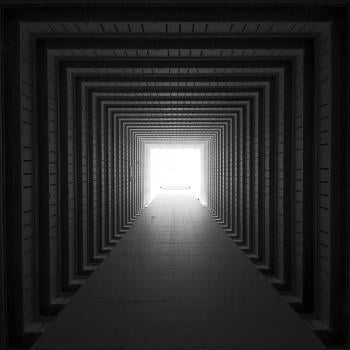In previous articles, we touched upon the idea that with the creation of our world comes a new comprehension of God—God-comprehension in a God-fuzzy world, in a world of nature and multiplicity. In nature and multiplicity, we find many powers and forces, and the Jewish initiative is to see God beyond the plethora of powers—to see God running the show behind the sun, moon, stars, etc.
Glancing at God
If a person were to poke a dog with a stick, the dog would jump at the stick, not the person. Let's say a few minutes later the same person pokes the dog with a chair, again the dog would go after the chair. If the person spent the rest of his day poking the dog with different objects, the dog would continue to focus his attention on the objects it is being poked with, rather than the poker himself. The dog thinks that the poking tools are actually the poking source—that each object is its own entity; that each object has its own independent power, and is trying to mess with him.
However, the human being is capable of seeing beyond the object in front of his eyes to look upon the source of that which "pokes" him. That is to say, the human being possesses the unique capability to live within the world of nature and multiplicity, yet recognize the Source beyond it.
When we perceive God in this manner, we refer to God as Elohim, literally meaning powers since we are recognizing God through the seemingly different powers in the world. We are seeing God as the Power behind all the powers.
Naming God
Similarly, every name we have for God has to do with a particular angle by which we approach God. Just as I have numerous names and titles based on the particular angle at which the other is viewing me (i.e., dad, son, teacher, friend, etc.), God has different "names" in accordance with the perspective by which He is being "viewed." (This is why, colloquially, Jews can be found referring to God as HaShem, literally meaning The Name, since whenever we are talking about God, it is only from our particular limited perception.)
However, I also have a name of essence that is beyond all of these limited titles and perspectives. My name of essence is Eliyahu Yaakov. And in a similar vein, God too, has a Name of Essence. God's Name of Essence is Y-H-V-H. Y-H-V-H is a combination of the Hebrew letters that spell the words meaning was, is, and will be, reflecting that the Infinite God encompasses and includes all possible names and angles imaginable. (Nowadays we do not say God's Name of Essence, since experiencing God on the level of totality associated with that name is beyond the limited state of our world. Instead, we often refer to God in prayer as Adonai, meaning my Master, since that is a more perceivable way the concept of God in relation to us can be portrayed.)
Being that our purpose and fulfillment is to bring forth God-clarity in this realm of fragmentation and multiplicity, we can frame our role in this world as being the unifiers of our limited perception of what is with the reality of what actually Is.
Uniting God and His Name
Overall, we can say, in a sense, that there are two "perspectives" of reality. There is Our Perspective, coming from within the world of multiplicity. And there is God's "Perspective," stemming from beyond the world of multiplicity.
Looking at things from the Infinite God's "perspective," it is clear that all is God. If Infinite means beyond the limits of finite existence, then even the finite is included within, and as an aspect of, the Infinite. This is what we mean when we say that God is One—we are not saying that God is one, as opposed to two, three, and four. Rather, we are saying that God is beyond the concept of numbers altogether. Thus, there is no entity independent from the Infinite; all is contained within, and as an aspect of, God—including the finite itself.
This is the message and function of the Shema, the classic Jewish mantra and motto. It is the declaration of the One Infinite Being as all there is.
Hence, the Shema is a declaration that the Jews—who specialize in communicating God-awareness—should know that Y-H-V-H (God's Perspective) and Elohenu ["Elohenu" is a variation of the name of God "Elohim"] (Our Perspective) are actually each aspects of God's one perspective.
Now, how does this make sense? If God has a perspective and we have a perspective, is it not clear that there are two independent perspectives?
This question can be approached with a comparison.
Think of a man living in your head. Let's call him Joe. Imagine Joe has thoughts, opinions, and choices. Joe may consider his thoughts to be thoughts of his own, but you know that all of Joe's thoughts can only exist within Joe's mind if you are giving the vitality for those thoughts to exist. Joe may talk in terms of him and you, but in the higher perception of reality, there is not you and Joe—there is only you!
Similarly, our entire consciousness, perspective, context, and existence are happening within the Infinite; while the Infinite is completely beyond us, it is the Infinite that is our very essence. This is God's "Perspective."
However, there is, as we have mentioned, another perspective—Our Perspective. Although not "as" true as God's Perspective, Our Perspective is a true perspective nonetheless. Since it does exist on our level, Our Perspective is a level of truth despite not being the truth of all truths.
This is what we will take an in-depth look into in next week's article—Our Perspective, and its relationship with God's "Perspective."
6/1/2011 4:00:00 AM





